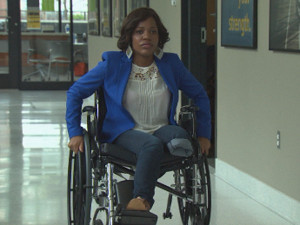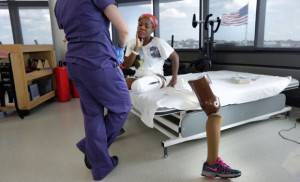True Courage Has A Name and it’s Mery Daniels.
Looking for inspiration? Look no further than the world of cycling. Almost everyday we hear of an incredible story of true courage that involves the world of cycling. What is it about bicycles and overcoming Everest-sized obstacles that seem to be a perfect fit. The story of Mery Daniels goes right to the heart of this wonderful conjunction of sport and spirit. A victim of the Boston Marathon Bombing, Mery lost one leg and had the other leg severely damaged. Months of despair slowly dissolved as she began to recapture her future through her bicycle.
The Boston Globe’s Eric Moscowitz wrote a wonderful fierce about Mery:
LIVING STRONGER BY THE DAY, MARATHON VICTIM AIMS FOR A BIG RIDE
The bicyclists in their matching jerseys cranked their way up Route 109, climbing past the smaller houses and low-slung businesses toward wooded properties with spacious lawns.
At the front of the pack, Mery Daniel pounded like a piston on her hand-powered bike.
“Come on, Mery!” someone shouted, and then someone else. “Come on, Mery, push! Let’s see what you got!”
Daniel is one of the most recognizable of the Boston Marathon bombing survivors, the only woman of color severely wounded, a 31-year-old Haitian immigrant and aspiring doctor who had been watching the race alone at the finish. In the terrible first months after the attack, which claimed one leg and seriously injured the other, she lay depressed and frustrated, marooned in a cinderblock hotel because she couldn’t climb the stairs of her Mattapan apartment. Now, on this early fall day, the cheers seemed to push her into a higher gear. She threw her whole upper body into each two-armed thrust of pedals, rocking in the angled seat of the recumbent bike.
Seven miles later, nearly 28 in all, Daniel climbed off to hugs and applause outside Gillette Stadium, having ridden as “a very special guest” for the first stage of a Waltham-to-Philadelphia bicycle challenge for 150 experienced riders, most of them wounded military veterans.
‘She just wants to move on, and she doesn’t want anything to get in the way.’
She walked gingerly on a prosthetic leg to a USO lunch trailer. “In a sense, I feel a lot stronger now,” Daniel said, easing into a camp chair with her food.
She did not just mean stronger than she was in those agonizing first weeks, when she was so weak she couldn’t get out of bed on her own. She meant stronger than she was before the blast.
That Mery Daniel, who took for granted walking on two feet, would never have donned a Spandex jersey for a 28-mile group bike ride. Though she regularly attended spinning class at her local YMCA, she had not been on a bicycle outdoors since childhood; a private person, she was not much for group outings with strangers.
But the new Mery heard that a Spaulding Rehab group was joining the first stage of the Ride 2 Recovery’s Minuteman Challenge and jumped in, despite having only tried out a handcycle a couple of times before, never for more than a few miles. But she liked the symbolism — 26 miles and then some, roughly marathon-length — and figured there was no harm in trying.
“She just leaps,” said Mary Patstone, director of adaptive sports for the Spaulding Rehabilitation Network of hospitals and outpatient centers. “She’s got the attitude ‘never say die, never tell me I can’t.’ ”
Still, it was just two weeks before the event that Daniel casually mentioned to her physical therapist that she had signed up for the September ride. “I said, ‘What?’ ” said Urvashi Chogle, who works with Daniel in the outpatient ambulatory clinic at the flagship Spaulding in Charlestown, and who ended up riding with her. “She just wants to move on, and she doesn’t want anything to get in the way.”
Barely a month after the attack, Daniel had smiled gamely when the cameras were on, donning Boston Strong shirts and talking about hope and resilience. But she evinced exhaustion and pain when the red light was off, as well as uncertainty about being jolted off the life course she had so determinedly set for herself. Interviews were a joyless necessity, a way to make up for lost time after getting a late start in the private fund-raising that many of the wounded were utilizing to augment payments from the One Fund and brace for a lifetime of out-of-pocket expenses.
Mery Daniel and her daughter, Ciarra, 5, embraced before the local segment of the Boston-to-Philadelphia ride began.
By late summer, ebullience had replaced reticence. Attending the opening of the PGA Tour’s Deutsche Bank Championship as a “Boston Strong” guest of honor, Daniel greeted a reporter she had not seen in three months with a warm hug. She quizzed the intern driving her around the country club in a cart about his studies, kidded him about the absence of refreshments.
Though she had never swung a golf club before, she subjected herself to the task before a phalanx of TV cameras in a hitting bay — missing on her first try, thwacking a grounder on her second, and joking about how she’d just been lining it up — and thanked the sponsors who promised custom clubs for Marathon victims. With her easy laugh and magnetic smile, the assembled media asked her how she maintained such optimism.
“It’s the support I get from everyone, especially Bostonians. The town has stood up and helped us in ways that I can’t even describe,” she said. And she was determined to set an example for her 5-year-old daughter, Ciarra: “Nothing should stop you in life. You’ve got to move forward, you’ve got to keep living, you’ve got to keep doing what you love.”
There are still days when it is a struggle to get out of bed, when her energy does not keep up with what she wants to do. But she acknowledged her own sea change, citing several reasons:
Getting out of the motel — “I hated it,” she laughed — and into a ground-floor apartment in the South End. Getting her prosthetic, so she could learn to walk on her own, and cook, and chase after her daughter. Connecting with other Marathon survivors, whom she has come to see as family, at Spaulding Rehab and outside. Meeting Bonnie St. John, an African-American amputee, Rhodes scholar, and Paralympic skiing medalist, who has become a mentor and friend. And receiving all those invitations.
Daniel has delivered the ceremonial first pitch at Fenway, gone backstage at a Beyoncé concert, and attended the home opener for the Patriots at Gillette as a guest of honor. She recently flew to Vienna to represent Boston on an Austrian television special reviewing the year in the news. Over the summer she tried sailing; next week she plans to ski for the first time, with a Breckenridge program for athletes with disabilities. In January she is registered to cycle in a half-marathon at Walt Disney World; in February she plans to join other Boston survivors on a group trip to France.
There have been quieter invitations, too — like a walk in her honor at the Weymouth school where her father works as a bus driver, the students presenting a collective check for $8,275, a kindergartner slipping her a hug and a sheaf of drawings — and strangers coming up to her on the street, telling her they’ve seen her on TV and are pulling for her.
Daniel understands that some of the survivors prefer to be invisible, at least sometimes, and that some observers might have “Boston Strong” fatigue. But the invitations and recognition have propelled her, made her feel she is part of something bigger than her own recovery. “The whole Boston Strong idea, how everybody came together — we didn’t feel like we were left alone.”
She knows it will taper off, but the activity has provided a diversion around rehab, a bridge until she finds work again. Daniel, who finished medical school overseas more than a year ago and was studying for the licensing boards at the time of the attack, is applying for clinical research jobs — to build her experience and earn a paycheck while resuming her board studies, with board passage a prelude to medical residency training at a hospital. Though once she was sure she wanted to be a family practitioner, she is now considering psychiatry or rehabilitative medicine, driven by her experience.
“I need to work,” she told Patstone, after getting fitted at Spaulding for a handcycle. “Then you feel like you’re back to yourself again. You’re part of society.”
She asked Patstone about the ride from Waltham to Foxborough. “Do you know if the route is going to be uphill or downhill?”
“It’s variable,” Patstone said.
Daniel laughed, a little nervously. “They always are,” she said.
Ten days later she set off with the Ride 2 Recovery group, following a course through Weston and Wellesley, Needham and Westwood, Walpole and Foxborough. After signing up, she learned that an experienced upright cyclist could push her if she was flagging, using a hockey stick affixed to the back of her loaner bike. Out on the road, though, she found that she was being pushed more of the way than she expected, so that the Philadelphia-bound pack could adhere to a regimented schedule — making her 28 miles more like a tandem bike ride.
It was still an unassailable accomplishment — those hills in particular — but Daniel couldn’t help feeling like she was itching for more of a test. Ride 2 Recovery, which provides custom cycles for military veterans, would be giving her a bike of her own. With practice, she knows she can pedal 26 miles without any push. Done being a spectator, she wants to ride in next year’s Boston Marathon.




![xxmerydanielride06[1]](http://www.bicyclemovies.com/wp-content/uploads/2013/12/xxmerydanielride061-300x207.jpg)




1 Comment
Easily, the post is really the greatest on this laudable topic. I concur with your conclusions and will thirstily watch forward to your future updates. Saying cheers will not just be sufficient, for the wonderful c lucidity in your writing. I will instantly grab your rss feed to stay privy of any updates. Solid work and much success in your business enterprise!
canada goose expedition parka men http://charmemaison.it/img/ita/saledeals.aspx?8